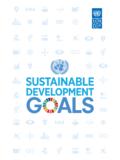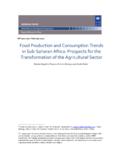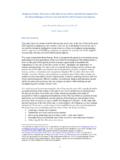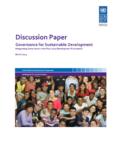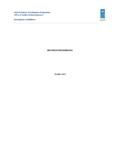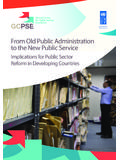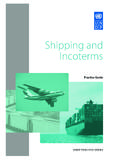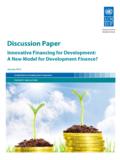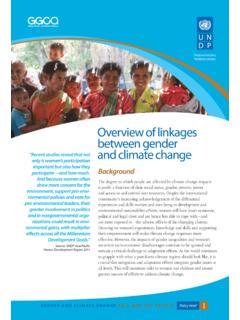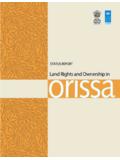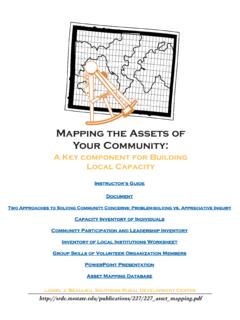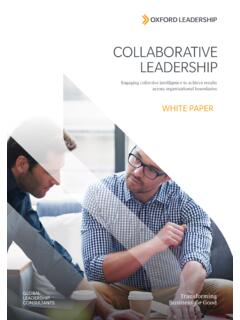Transcription of UNDP Guidelines on Engaging with FBOs and Religious Leaders
1 UNDP Guidelines on Engaging with faith - based Organizations and Religious Leaders October 2014 Table of contents Table of contents .. 1 Acknowledgements .. 2 1. Introduction .. 3 2. Purpose of these Guidelines .. 3 3. 4 4. Why engage? Opportunities and comparative advantages .. 6 5. Challenges, risks and mitigation strategies .. 9 6. Guiding partnership principles .. 12 7. Putting these principles into practice .. 15 Annexes .. 21 UNDP Guidelines on Engaging with faith - based Organizations and Religious Leaders 2 Acknowledgements UNDP gratefully acknowledges the valuable inputs and guidance from UN colleagues and civil society partners in developing these Guidelines . Our special thanks go to members of the UNDP Civil Society Advisory Committee who provided written comments: Lydia Alpizar Dur n, Myrna Cunningham-Kain, Paul Okumu and Antti Pentik inen.
2 We are deeply grateful for the extensive feedback and expert guidance received from FBO partners around the world: Gorden Simango (ACT Alliance); Jude Waweru (Association of Member Episcopal Conferences in Eastern Africa); Gabriel Torres and Joe Donnelly (Caritas Internationalis); Ingrid Hagen (Cordaid); Eva-Marita Rinne-Koistinen (Finn Church Aid); Waleed Gabr (Islamic Relief USA); Rigobert Minani Bihuzo (Jesuit Africa Social Centres); Sally Dunne (Loretto Community); Ralston Deffenbaugh (Lutheran World Relief); Mike Gallagher and Peter Balleis (Jesuit Refugee Service); Andrew Tomlinson (Quaker United Nations Office); Kazunari Fujii (Sokka Gakkai International); Firmin Adjahossou (Symposium of Episcopal Conferences of Africa and Madagascar); Meg Gardinier and Masue Suzuki (World Day of Prayer and Action); and Frank Fredericks (World faith ).
3 Our special thanks to Daniel Perell, Julia Berger and Ming-Hwee Chong from Baha'i International Community, who co-convened with UNDP an informal working meeting on 1 May 2014 with civil society partners. The document also benefited from the inputs of UN colleagues in the Inter-Agency Task Force on Engaging faith - based Organizations for Development, especially from Azza Karam (UNFPA); Jose Riera (UNHCR); David Ponet and Caterina Tino (UNICEF). Our thanks also to United Nations colleagues Ron Kraybill (UNRCO Philippines), Ame Esangbedo, and Peter Devereux (UNV) for their significant inputs. Started under the leadership of the UNDP Civil Society Team, these Guidelines were finalized by the Inclusive Political Processes Team in the Bureau for Policy and Programme Support.
4 We acknowledge with appreciation the many inputs from colleagues in UNDP who helped us to document experiences of their partnerships with civil society and contribute to case studies. UNDP colleagues contributed insights and experiences in online discussions, in particular through the UNDP Civic Engagement Network. We are grateful for the overall guidance of Bharati Sadasivam, the coordination and research from Nadine Ravaud, and editorial assistance provided by Hope Traficanti. In UNDP Country Offices and regional centres: Idrees Aalimi, Noorullah Ahmadzai, Stefano Cordella and Doel Mukerjee (Afghanistan); Raquel Rico-Bernabe (Benin); Elfatih Abdelraheem, Khadija T. Moalla, Maya Morsy and Alyaa Nabil (Egypt); John Macauley (Turkey); Jenny Espinoza (El Salvador); Samuel Choritz and Dieudonne Tshiyoyo (Ethiopia); Lawrence Lachmansingh (Ghana); Teuku Rahmatsyah (Indonesia); Rebecca Adda-Dontoh (Malawi); Becaye Diarra (Mali); Gerardo Berthin (Panama); Amata Diabate (Rwanda); Alain Akpadji (Senegal); Abderrahman El Yessa (Tunisia); William Tsuma and Amarakoon Bandara (Zimbabwe).
5 At UNDP headquarters: Muni Ahlawat, Suki Beavers, Jose Dallo, Vanda Dias dos Santos, Samuel Doe, Beniam Gebrezghi, Abdel-Rahman Ghandour, Narmina Guliyeva, Verena Linneweber, Vesna Markovi -Dasovi , Kyo Naka, Ayodele Odusola, Luqman Patel, Corrado Quinto, Gay Rosenblum-Kumar, Nika Saeedi, Karin Santi, Emanuele Sapienza, Rose Sarr, Alex Shoebridge, Moises Venancio and Douglas Webb. UNDP Guidelines on Engaging with faith - based Organizations and Religious Leaders 3 1. Introduction faith matters to people, and matters to development. In many parts of the world, faith - based organizations (FBOs) and Religious Leaders (RLs) are influential in both the political and social spheres, and have a broad following in society.
6 Their presence in local communities, coupled with their capacity to deliver critical services, allow them to mobilize grassroots support, earn the trust of vulnerable groups, and influence cultural norms all of which make them vital stakeholders in development. with their involvement in local communities and their standing as moral Leaders , many FBOs and RLs command the respect of local and national authorities, which can make them valuable peace mediators in tense environments. Working with FBOs and RLs is especially crucial in areas where governance structures are weak and fail to ensure human rights and administer basic services, including in relation to protection, justice and education.
7 UNDP engages with FBOs and RLs in many areas including democratic governance, sustainable development, conflict prevention, peace building, poverty reduction, combating HIV and AIDS, and promoting women s rights and gender equality. In many countries, UNDP supports capacity development, interfaith dialogue and networking of faith actors. FBOs and RLs can link development actors with beneficiary communities, and Engaging them in the right conditions can enhance development impact and sustainability. This may involve consulting with FBOs and RLs to: (i) ensure their meaningful participation in policy dialogue processes facilitated by UNDP; (ii) help determine UNDP country programme priorities; and (iii) include them in programme design, implementation, monitoring and evaluation.
8 UNDP will need to be selective in partnering (either informally or through formal agreements) with FBOs and RLs to ensure that such partnerships are based on shared values, objectives and commitments, in particular as they relate to gender equality and women s empowerment, and respect for universal human rights. faith actors are diverse: there can be significantly divergent priorities and viewpoints within a single faith tradition, and even greater divergence between the practices of different faith and spiritual traditions. From Religious institutions to local community service providers, it is important to understand the missions of potential partners and their capacity to deliver, and carefully assess the extent to which a common ground can be found on the basis of shared values.
9 It is therefore critical that UNDP staff assess the benefits and risks of potential relationships with FBOs and RLs within their specific context before Engaging or partnering with them. 2. Purpose of these Guidelines These Guidelines are part of the Action Plan of the 2012 UNDP Civil Society and Civic Engagement Strategy1. The strategy emphasizes the need for UNDP to develop innovative relationships with a diversity of civil society actors, including women s rights networks, youth groups, faith - based groups and 1 UNDP Civil Society and Civic Engagement Strategy (2012). UNDP Guidelines on Engaging with faith - based Organizations and Religious Leaders 4 grassroots organizations.
10 It is a useful framework for both empowering and Engaging civil society to achieve both downstream local development results and upstream policy impact, underscoring that civic engagement is intrinsic to the work of UNDP. The need to expand participation in pursuit of equitable access to development is further emphasized in the UNDP Strategic Plan2 and other important strategies including the UNDP Gender Equality Strategy3 and UNDP Youth Strategy4. For the first time since its creation, a representative from the faith - based community was nominated to the UNDP Civil Society Advisory Committee in 2012. These Guidelines aim to encourage UNDP staff to streamline faith -sensitive development policy and programming that contributes to sustainable human development.
